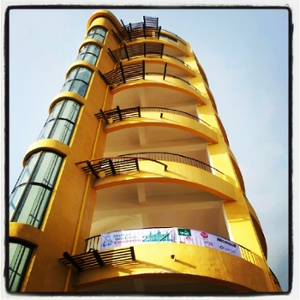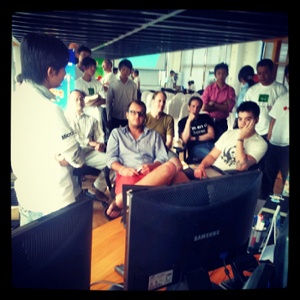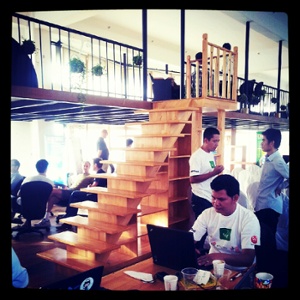 When Meng Wong and I founded JFDI, we called it JFDI.Asia for a reason. We knew that the strength of our location in Singapore was its centrality to the Asia-Pacific region. Right now feels like springtime for startups all around us.
When Meng Wong and I founded JFDI, we called it JFDI.Asia for a reason. We knew that the strength of our location in Singapore was its centrality to the Asia-Pacific region. Right now feels like springtime for startups all around us.
The chance to contribute to the second Startup Weekend Cambodia as a judge at the demos was a great opportunity to share the spirit of a new startup community taking off. It all happened last Friday through Sunday at the city’s spectacular new Yellow Tower.
The next billion people coming online live within four hours’ flying time of Singapore. Most are experiencing the internet for the first time from a new generation of affordable mobile devices, in a developing world context that’s very different to the places the internet took hold across the West.
But some things are the exactly the same, like the enthusiasm of young entrepreneurs who want to have a go at changing the world around them. Those entrepreneurs have access to exactly the same tools and know-how as anyone else in the world. Last Friday to Sunday saw Phnom Penh’s second Startup Weekend event, hosted by local digital success story Yoolk which is re-inventing the old Yellow Pages concept for a digital age.
http://www.youtube.com/watch?v=DlayORza9gg
JFDI sponsored runner-up prizes at Startup Weekend Cambodia, so I was delighted to have an excuse to make my first visit to a country that figured large in the TV news when I was growing up through the 1970s.
Now, in much happier times, Sacha Pasti from Phnom Penh’s South Eastern Globe asked me a series of questions to try and put Cambodia’s startup scene in context.
What are some of the trademarks of a successful entrepreneur mindset?
A researcher called Saras Sarasvathy did some fascinating research into this a decade or so ago. She found that what students are taught to do in business schools – set a goal and work out the best way to achieve it – is the exact opposite of what successful entrepreneurs seem to do.
Sarasvathy suggests that the MBA way is great, if what you want to do is optimize something that’s already up and running and where there’s lots of information about the situation at hand. The approach is founded on the belief that “If I can predict the future, I can control it.”
But if you want to start something from scratch, where there are many unknowns, the best approach seems to be to understand who you are, what resources you have to hand and how much you’re prepared to gamble and lose. Only then do you start to explore where that might take you. Entrepreneurs believe “If I can control the future, I do not need to predict it.” Where you are going is less important than feeling confident that you understand how to make things happen.
 Think of the first long-distance voyages of discovery, when sailors set out to explore uncharted oceans. They didn’t know where they were going because there were no maps. But they did know how to manage a crew on a ship through all the situations that happen at sea and that’s what gave them the ability to discover distant lands. Within the limits of extreme weather, they were in control of their future, even though they could not predict where their voyages would take them. Our startup crews are on a journey that’s much the same.
Think of the first long-distance voyages of discovery, when sailors set out to explore uncharted oceans. They didn’t know where they were going because there were no maps. But they did know how to manage a crew on a ship through all the situations that happen at sea and that’s what gave them the ability to discover distant lands. Within the limits of extreme weather, they were in control of their future, even though they could not predict where their voyages would take them. Our startup crews are on a journey that’s much the same.
To systemmatize this view of life, we teach an approach called Lean Startup Methodology. It’s all about minimizing wasted effort as startup companies explore how to control their future.
At JFDI.Asia, we aren’t really interested in the ideas that startups have about what they think might make a great business, because when we start out, those ideas are just talk – theories about what lies beyond the known horizon. Neither we nor they have a crystal ball to tell us whether theoretical ideas are good goals to work towards, or not. So we are much more interested in empowering teams to test out aspects of their ideas methodically, and to feel confident changing the idea as they learn what customers actually want. The great thing about Lean Startup Methodology is it gives us a way to do that testing in a way that builds commercial value in a business, without constraining creativity.
If a lightbulb is the icon of a great idea, then the archetypal inventor-entrepreneur who created it, Thomas Edison, summed up the approach when he was asked to describe how he came to create a working prototype:
“I would construct a theory and work on its lines until I found it was untenable. Then it would be discarded at once and another theory evolved … I speak without exaggeration when I say that I have constructed 3,000 different theories in connection with the electric light, each one of them reasonable and apparently likely to be true. Yet only in two cases did my experiments prove the truth of my theory.”
In other words, as Edison also said, genius is 99% perspiration and only 1% inspiration.
How did Startup Cambodia compare to other entrepreneurial events in the region?
 It’s inspiring to see Startup Weekends around the region all following a similar pattern and Cambodia was no exception. The Startup Weekend formula works wherever it’s been tried, and this event was just the same. It’s a great way to introduce people who might be living and working nearby but might never have met before. Rather than just talking, they learn about each other by doing something together. Real prototypes were created this weekend and it doesn’t matter much whether those specific ideas get developed or not. The lasting value is in the friendships and “social capital” that startup weekend creates. In the months and years ahead, that is what will yield dividends.
It’s inspiring to see Startup Weekends around the region all following a similar pattern and Cambodia was no exception. The Startup Weekend formula works wherever it’s been tried, and this event was just the same. It’s a great way to introduce people who might be living and working nearby but might never have met before. Rather than just talking, they learn about each other by doing something together. Real prototypes were created this weekend and it doesn’t matter much whether those specific ideas get developed or not. The lasting value is in the friendships and “social capital” that startup weekend creates. In the months and years ahead, that is what will yield dividends.
Cambodians made up for approximately 35% of participants over the weekend, would you have liked to see more local participants?
I have been to about ten startup weekends around the world now and everywhere I go there are a high proportion of people from ‘out of town’. So, on the one hand, it would be good to see more Cambodians participating and no doubt as awareness of Startup Weekend grows locally, that will happen. But it’s also worth remembering that most of the value in Silicon Valley is created by immigrants.
I am an immigrant myself (to Singapore) and I know at first hand how being new to a country can sometimes let you see opportunities all around you that aren’t so obvious if you have always lived there. You can mix up ideas from your old home with what you see around you. An obvious place you see that happening the world over is in fusion food. Cooks can’t resist re-interpreting their ancestors recipes once they’ve tasted what the neighbours cook up with the same ingredients.
Perhaps as more Cambodians get the chance to travel outside their country they too will find that cross-fertilizing ideas with foreigners can be the quickest way to come up with something genuinely new.
How did the performance of Cambodian led teams compare with the other teams?
The Cambodian teams I saw were just as strong as many others around South East Asia.
However, I do see a pattern where some countries have had more opportunities to grow local success stories. That means that they have ‘local heroes’ that young people can look up to and emulate.
This is just starting to happen in Singapore’s tech scene. A few businesses have got serious venture capital funding and large numbers of users and there are even now some ‘exits’ at fairly modest valuations. But in the Philippines, for example, there are fewer role models and I guess that’s probably true in Cambodia too. So the heroes folk can look up to are less obvious, for the time being.
It does take a while to build an ecosystem and for the stories about what makes for success to become self-reinforcing beliefs that “it can happen here too.” I have every confidence that will happen in Cambodia just as it has happened everywhere else that has developed a successful tech ecosystem.
What is the value of entrepreneurship to societies?
I guess economists would have a fuller, helicopter view on that question but I’ll give a much more human, worms-eye perspective.
When things are messed up and there is uncertainty, because so much is changing so fast, it’s easy to feel despair. Many people long for certainty and perhaps look for a strong authority to come in and fix things with a master plan.
Trouble is, strong men with simple plans to fix complex problems have a bad track record running societies, as Cambodians know only too well.
The great thing about entrepreneurs is that they are just ordinary people with a very practical approach to solving real problems, right now. Their strength does not lie in armies or imposing a master plan from the top downwards. Rather they have a belief that, so long as they can understand a little of how to make stuff happen today, the big picture will sort itself out tomorrow. In other words, they work ‘bottom up’.
Uncertainty actually gives entrepreneurs opportunity and that’s why it feels to me that the time and the environment in Cambodia is ripe for entrepreneurship now. You could say that a lot is messed up, but an entrepreneur would say there are massive opportunities to fix things all around.
In contrast, it’s quite hard to find stuff that needs fixing in Singapore, because the government there is so effective. Singaporeans rarely get the chance to practice the skills needed to cope with uncertainty, so events like minor flooding or breakdowns on the train system can feel like national disasters.
Singapore has come a long way with the “master plan” approach and was lucky enough to find a benign strong man to drive it through. A challenge for Singaporeans now is to rediscover the ability their grandparents and great grandparents had to live with uncertainty and to make the most of it.
Cambodians of all classes are forced to deal with challenging situations just getting through a normal day. The skills that teaches mean they can learn and improve on the experience of countries like Singapore, just as Singapore learned and built on the developed world as it was developing.
What were some of the strengths and weaknesses of the startup event over the weekend?
For me a strength was seeing the enthusiasm of the participants and the diversity of people involved. I was really inspired by all the questions that young people asked me. I got the sense that there’s a real hunger here to create innovation in Cambodia, for Cambodia.
A weakness perhaps is that many Cambodians have not had the chance to travel outside the country. So perhaps they don’t realize that there’s a much bigger opportunity for them to create companies at low cost here that could sell to the world, or if they do see that opportunity, they don’t know how. In Cambodia, for Cambodia is a good start, but in Asia, for Asia could be a better way to look at the world.
You spoke about the need for entrepreneurs to see the big picture – can you go over this point and whether the ability to think ‘outside the box’ may have limited entrepreneurship in the country so far.
One of the reasons we called our company the Joyful Frog Digital Incubator is because an ancient story about a frog in a well is common to both China and Japan. Perhaps there is a variation of the story in Cambodia too?
 The story goes something like this: a frog lives at the bottom of a well and has all he needs. His life is humble but seems complete. Then, one day, a turtle pokes his head over the edge and tells the frog about a great ocean that lies beyond the well. It offers amazing opportunities. The frog feels ashamed that he never thought to take a joyful leap out of the well and to explore that wider world.
The story goes something like this: a frog lives at the bottom of a well and has all he needs. His life is humble but seems complete. Then, one day, a turtle pokes his head over the edge and tells the frog about a great ocean that lies beyond the well. It offers amazing opportunities. The frog feels ashamed that he never thought to take a joyful leap out of the well and to explore that wider world.
It was not a choice for Cambodians to mostly stay inside their own country. That has been forced upon the nation by history and economics. Yet perhaps these forces have put Cambodians in the same situation as the frog at the bottom of the well.
There is a risk that the entrepreneurship scene here will create only small local businesses. If that happens, the international turtles who come poking their necks into the country may not be as friendly as the one the story. They may end up taking the bigger opportunities that should be shared with Cambodians and that would be a shame.
Does Cambodia represent a unique market for international entrepreneurs?
Selling into Cambodia, the market looks rather similar to many developing markets in Asia. However, selling out of Cambodia, the fact that talented developers are able to earn a good living here while still pricing themselves very competitively, compared to similar talent in neighboring countries, means that Cambodia has a special advantage.
If local developers can team up with international partners who have experience they lack, together there is every reason to believe that they can get their fair share of the most of the massive opportunities as the next billion people come online in this part of the world.
Cambodians live and breathe the reality of life in modern, fast-developing Asia every day. They understand far more immediately what today’s Asians getting affordable smart phones and internet access for the first time really want, than do developers in Silicon Valley. Furthermore, there is no reason why all kinds of services from education to healthcare that have still to fully develop in Cambodia should do so in the same way that they have in the developed world. There is every opportunity to leapfrog the developed world and to create new solutions, as is happening in India and China.
How does one foster the entrepreneurial spirit in a country that continues to value lecture based learning above critical-thinking?
Culture changes far more slowly than technology. My own perception, as someone new to Asia, is that one of the strengths of societies across the region is respect for elder authorities, whether that be teachers or parents. It creates stability and a basic respect for other people even when the world is changing fast. The difficulty with unquestioning respect for the past is that it can also stop people imagining a new future where disruption might be positive.
My business partner Meng Wong and I are currently working with a new university in Singapore that is linked to the famous MIT in Boston. It’s been fascinating to develop exercises that will expose students to situations where there are no right or wrong answers.
That’s deeply unsettling for students who have succeeded, up until now, in working out what are the hidden rules of the game at hand and then playing to get the best grades. If there are no rules, you have to use different strategies and we have found that we need to make it clear to students that they have permission to think for themselves as well as giving them the chance to practice the new thinking skills required.
In particular, it’s vital that students stop thinking about a black and white sense of something being right or wrong. That’s because this kind of thinking implies a risk of being criticized by ‘failing’ and ‘getting it wrong’.
Instead, we encourage students to redefine ‘failure’ as ‘feedback’.
So the world didn’t turn out how you expect? Congratulations – now you have learned something you didn’t know! If the world just goes according to plan, you will never know why.
Cambodians live in a world with a lot less certainty than many people in the developed world. Yet through the internet they have access to all the same technology and previous examples of work as do the best in the world. For me, the key to fostering an entrepreneurial spirit in Cambodia is to celebrate the successes that local people are already enjoying and to have an honest, non-judgmental dialogue about the ‘failures’ too. Then everyone can learn from what works.

